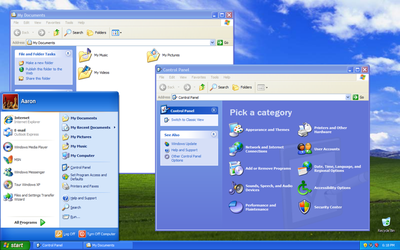Microsoft is the world's leading producer of computer software.
Microsoft was incorporated in 1981, but the company's roots go back at least as far as 1975, when
the first commercially available personal computer
appeared on the cover of Popular Electronics. The Altair 8800, as it was
called, was a rudimentary system, but it found a market for home-based computers that in turn
created a new demand: software to use with them. Bill Gates and his friend Paul Allen immediately
saw the potential. Gates contacted the company that made the Altair, MITS (Micro Instrumentation
and Telemetry Systems), and offered to write a program for the new computer. Gates and Allen
created an interpreter for BASIC, then a mainframe
programming language, for use with the Altair. MITS hired both Gates and Allen in 1975, but by 1976
they had left to devote more time to their own fledgling company, Microsoft (from
microcomputer and software).
Sep 2, 2002
Nov 10, 2001
Random Access Memory (RAM) - GujaratiKanudo
RAM (random access memory) is the place in a computer where the operating system, application programs, and data in current use are kept so that they can be quickly reached by the computer's processor. RAM is much faster to read from and write to than the other kinds of storage in a computer, the hard disk, floppy disk, and CD-ROM. However, the data in RAM stays there only as long as your computer is running. When you turn the computer off, RAM loses its data. When you turn your computer on again, your operating system and other files are once again loaded into RAM, usually from your hard disk.
Sep 2, 2001
Blog (Weblog) - GujaratiKanudo
A blog (short for weblog) is a
personal online journal that is frequently updated and intended for general public consumption.
Blogs are defined by their format: a series of entries posted to a single page in
reverse-chronological order.Blogs generally represent the personality of the author or reflect the
purpose of the Web
site that hosts the blog. Topics sometimes include brief philosophical musings, commentary on
Internet and other social issues, and links to other sites the author favors, especially those that
support a point being made on a post.
The author of a blog is often referred to as a blogger. Many blogs syndicate their content to
subscribers using RSS, a
popular content distribution tool.
For more information, see weblog.
-MEHUL PATEL
Aug 25, 2001
Jan 10, 2001
Multitasking
Multitasking, in an operating system, is allowing a user to perform more than one computer task (such as the operation of an application program) at a time. The operating system is able to keep track of where you are in these tasks and go from one to the other without losing information.
Microsoft Windows 2000, IBM's OS/390, and Linux are examples of operating systems that can do multitasking (almost all of today's operating systems can). When you open your Web browser and then open Word at the same time, you are causing the operating system to do multitasking.
Being able to do multitasking doesn't mean that an unlimited number of tasks can be juggled at the same time. Each task consumes system storage and other resources. As more tasks are started, the system may slow down or begin to run out of shared storage.
It is easy to confuse multitasking with multithreading, a somewhat different idea.
Microsoft Windows 2000, IBM's OS/390, and Linux are examples of operating systems that can do multitasking (almost all of today's operating systems can). When you open your Web browser and then open Word at the same time, you are causing the operating system to do multitasking.
Being able to do multitasking doesn't mean that an unlimited number of tasks can be juggled at the same time. Each task consumes system storage and other resources. As more tasks are started, the system may slow down or begin to run out of shared storage.
It is easy to confuse multitasking with multithreading, a somewhat different idea.
-MEHUL PATEL
Subscribe to:
Posts (Atom)





